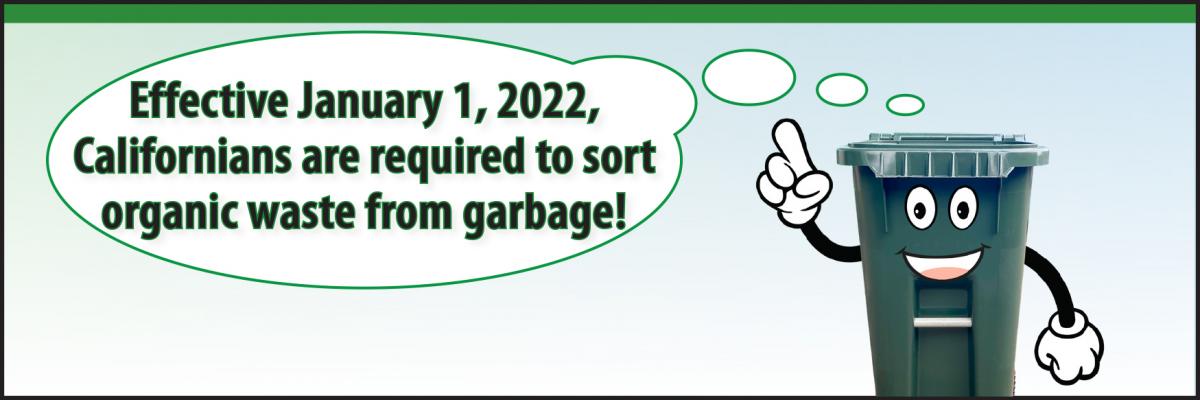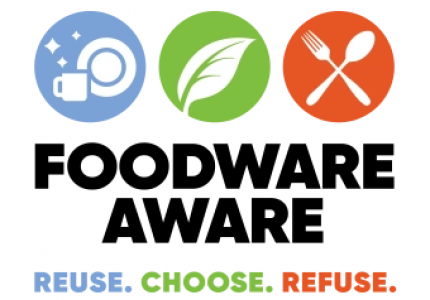Waste and Recycling

Brisbane, in cooperation with our waste haulers, provides services and programs that have resulted in 76% of the waste generated by residents and businesses being diverted from landfill, exceeding the State's goal of 75% waste diversion by 2020. South San Francisco Scavengers serves all of Brisbane, except for Tunnel Avenue, which is covered by Recology.
SB1383 - organic waste reduction law - effective Jan 1, 2022
- Adopted by the state in 2016, SB1383 set methane emissions reduction targets in a statewide effort to reduce emissions of short-lived climate pollutants. The targets must:
- Reduce organic waste disposal 50% by 2020 and 75% by 2025;
- Rescue for people to eat at least 20% of currently disposed surplus food by 2025.
- The law requires all residential and commercial customers to have compost (green bin) service. If you do not already have service, call South San Francisco Scavenger at 650.589.4020 to get set up.
- Residential customers (single-family homes with weekly curbside cart service) pay an integrated rate for waste collection; there is no additional charge for adding a green cart.
- Commercial customers (including multifamily residential properties where waste bins are shared by many families) incur a charge for adding green bin service. This charge is usually mitigated by decreasing garbage collection. It is the property owner or manager’s responsibility to contact South San Francisco Scavenger to start green bin service. Individual tenants should encourage them to do so.
- Waivers may be available for those with low generation, physical space constraints, or self-hauling. Complete this form to request a waiver.
- Meeting state and local goals requires that everyone properly sort their waste.
- Your green bin is only for organic waste materials: yard trimmings, food scraps, food-soiled paper, wax-coated paper (like parchment paper, wax paper, wax-coated produce boxes). The green bin is not for items that look like plastic—regardless of what their label may say.
- Clean/dry paper and cardboard belong in the appropriate blue bin (under the grey lid if you have a split recycling cart).
- Visit SSF Scavenger's Sort Smart guide if you need help determining where something goes.
- The law includes Edible Food Recovery requirements:
- Edible food recovery is the act of diverting surplus edible food from businesses, organizations, or events that otherwise would have been disposed of for consumption by members of our community. If you are a large, food-generating business or organization you have new edible food recovery requirements under SB 1383.
- Brisbane has joined with other local jurisdictions to create one countywide edible food recovery program to help all affected businesses and organizations meet their new mandatory requirements. This program is managed by the County of San Mateo Office of Sustainability and has recovered millions of pounds of food to date!
- Visit www.smcsustainability.org/generator-edible-food-recovery-requirements to learn about the countywide program, see if your business has new edible food recovery requirements, and resources available to help you comply.
- The law also requires the City to:
- Procure a certain quantity of compliant compost, mulch, renewable natural gas, or electricity from biomass, in order to provide a market for composted materials and thus close the loop.
- Procure paper products which have a minimum of 30% post-consumer recycled content and which are recyclable.
- Monitor compliance and conduct enforcement.
- The Brisbane City Council adopted Ordinances 663 and 664 in fall 2021 to facilitate compliance with the state regulations.
Programs for Residents
- Backyard compositing is promoted through offering the County's compost and worm bins to residents at a reduced cost. The rebate application can be found here.
- Every Spring, the City hosts a free compost giveaway.
- South San Francisco Scavenger offers a mattress recycling program where there is no charge for disposal of up to 4 mattresses / box springs. Must be brought in alone to Blue Line Transfer Station, or click here for information on scheduling a pick up.
- Recycle your electronics at Green Citizen or Blue Line Transfer; Green Citizen also takes Number 6 Styrofoam.
- Recycle household batteries and cell phones right to protect the community and the environment from fire hazards and toxic pollution. For residents with communal trash enclosure bins, you may recycle your batteries at City Hall by dropping them in the bin behind the front lobby counter (10 battery limit per zip-top bag).
- San Mateo County’s Household Hazardous Waste Program offers free hazardous waste recycling and disposal services for San Mateo County residents.
- San Mateo County's Office of Sustainability hosts free e-waste collection events throughout the year.
- CFL and Battery collection at City Hall | you can recycle your batteries following these instructions from SSF Scavenger. Residents can recycle CFLs through San Mateo County’s HHW Program. They can also be recycled for a fee at Blue Line Transfer.
- Film plastic and plastic bags cannot be recycled through SSF Scavenger. Some grocery stores and other retailers have drop-off locations. Find a convenient location at bagandfilmrecycling.org.
How You Can Help
- Swap out single-use plastics for reusable alternatives to help reduce plastic pollution.
- Reduce food waste through smart planning, prepping and storing.
- Use the Sort Smart Recycling Guide to wort your waste properly and help reduce the amount of trash sent to the landfill. If in doubt, find out!
- Businesses and grocery stores can donate food to Second Harvest Food Bank or participate in the San Mateo County Safe Surplus Food Donation Program.

